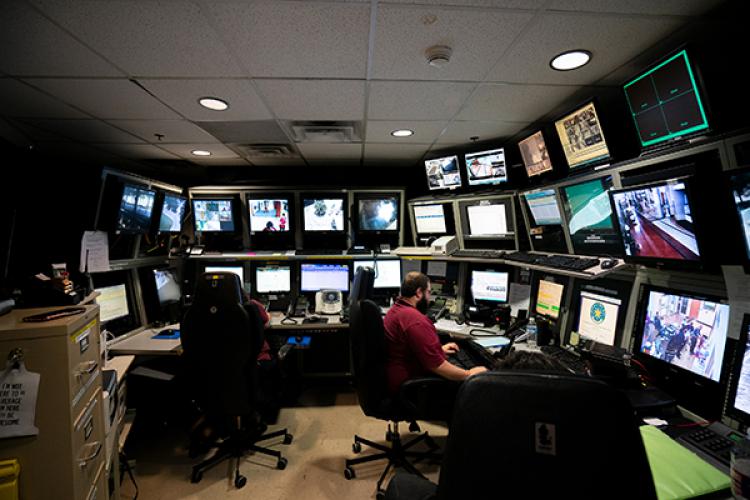
You don’t often see them. But the Tarrant County Hospital District Police Department communications officers are on duty 24 hours a day, seven days a week, looking out for you.
In a dimly lit room behind a locked door, the communications officers – also known as dispatchers -- are constantly vigilant, scanning two walls of monitors for any sign of trouble. At the same time, they’re working the phones and radios on which they answer calls of distress and queries for information, sending the right people to the right place whenever they’re needed.
“There is never a dull day, every single one of them is different,” said dispatcher Michael Gabriel, even though he rarely gets to leave his chair during an eight-hour shift. “I love my job. I feel like I am doing something to help people, but I prefer to be behind the scenes. I’m not looking for any recognition. I don’t want any credit. I just want to get people the help they need.”
Gabriel said he’s fielded as many as 50 calls in an hour on busy days and had to log as many as 150 reports in a single day.
While they don’t get much recognition because they work behind closed doors, Lt. Leslie Hawkins said dispatchers shouldn’t be taken for granted.
“They have – by far – the most difficult job with the police department,” Hawkins said. “The phones are always ringing and their radios are always going. Often when people call for help, they’re upset. It’s a special skill to be able to calm them down so dispatchers can get the information and details officers need to be able to help.”
Getting those details is vital for the safety of not only the people in need of assistance, but also that of officers who need to know everything they can about the danger they’re running toward before they get there. Anything police can learn about a person’s situation -- from why they’re upset to the nature of any injuries they may have suffered -- can be the key to a peaceful resolution.
Gabriel said the most rewarding day he’s had on the job as a dispatcher came when he fielded a call from a 15-year-old girl who reported she was suicidal. Although she was not on the hospital campus during her time of need and was not in the health network’s jurisdiction, she sought out JPS police for care. Getting the caller the help she needed required Gabriel’s complete attention for an extended period of time, so he had to ask other Police Department staff members to answer incoming calls until the job was done.
“I had to keep her on the phone and calm her down while I tried to figure out where she was,” Gabriel said. “We ended up being able to bring her here for care. It was a tough day. But it turned out to be a great one. It’s definitely something I will always remember.”
In June, the state of Texas passed a law to officially recognize dispatchers as first responders. The law, which goes into effect Sept. 1, was designed to recognize the efforts emergency communicators make to keep the public safe.
“The Tarrant County Hospital District Police Department could not function without the professional support provided by our Police Communications Team,” Director of Public Safety and Parking Services and Police Chief Randell Hayen said. “Twenty-four hours a day, seven days a week, the Police Communications Officers work behind the scenes to ensure the safety and security of our patients, visitors, and fellow team members. I am extremely proud to have them as members of our team and am very thankful they are here to look after us every day.”
